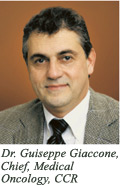
Guest Update by Dr. Guiseppe Giaccone
An Honor to Help Foster Progress at NCI
 It was nearly 20 years ago when I first came to NCI, spending 2 years conducting basic research on lung cancer at the U.S. National Naval Medical Center in Bethesda, MD. I eventually took a post abroad in the Netherlands, but I am elated to return to NCI as the new chief of the Medical Oncology Branch in the Center for Cancer Research (CCR). It was nearly 20 years ago when I first came to NCI, spending 2 years conducting basic research on lung cancer at the U.S. National Naval Medical Center in Bethesda, MD. I eventually took a post abroad in the Netherlands, but I am elated to return to NCI as the new chief of the Medical Oncology Branch in the Center for Cancer Research (CCR).
I greatly enjoyed my 16-year tenure at the Free University Hospital in Amsterdam. But it is a welcome opportunity to once again be part of NCI and its efforts to spearhead continued advances in cancer research and to train the next generation of cancer researchers.
Working with CCR Director Dr. Robert Wiltrout and CCR Scientific Director for Clinical Research Dr. Lee Helman, I will focus on forging closer ties among CCR's medical oncology community and play a leadership role in facilitating translational research as it relates to the development of novel agents and approaches. By more closely aligning the activities and communications across CCR we can increase efficiency and effectiveness, establish new collaborations with extramural partners, and strengthen training opportunities, while also ensuring the most judicious use of our resources.
The Medical Oncology Branch will embrace the unique opportunities for translational research afforded by access to the NIH Clinical Center. With closer coordination and collaboration among CCR's medical branches, I'm confident we can improve accrual to clinical studies, particularly those involving rare cancers.
I'm also looking forward to continuing my own research related to developing new treatments for lung cancer. I have been particularly interested in how cancer cells manage to avoid programmed cell death, or apoptosis, and continue their uncontrolled proliferation. There are several apoptosis modulators under study at the moment. My own recent work, for instance, has shown that the proteasome inhibitor bortezomib modulates an important molecular mechanism of apoptosis in lung cancer and may have promise in treating non-small-cell lung cancer in combination with other molecules, such as rTRAIL, that engage apoptosis through a different pathway.
I also will lead NCI's Lung Cancer Program, an NCI effort announced last year by Dr. Niederhuber to improve the early detection and treatment of lung cancer. This program is an excellent example of the type of collaborative effort in which not only CCR's medical branches can participate, but also can be expanded to include other NIH institutes, as well as extramural investigators and industry. There are many advantages to be gained by creating stronger connections between CCR scientists and the extramural community.
While I will be involved in lung cancer-specific efforts, my primary focus and goal will be on managing the Medical Oncology Branch and working with the other CCR laboratories and branches to facilitate translational research activities and catalyze novel agent development and testing in the clinical setting. Although I've been on the job for less than a month, I'm hopeful about the prospects for rapid progress. Finally, I'm honored to have been chosen for this position and believe I can be part of a new era of significant advances in cancer research.
|